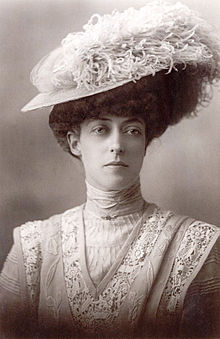The Queen had been christened as Louise Victoria Alexandra Dagmar, but when she came to choose her regnal name, she would discard Louise as not quite regnal enough, and Dagmar as not quite English enough. Her father had suggested, when the topic had occasionally been broached, that there should only ever be one Queen Victoria which left her with Alexandra.
And therefore on 4th May 1910, Her Royal Highness, The Princess Royal became Alexandra, by Grace of God, of the United Kingdoms of Great Britain and Ireland and of the British Dominions beyond the Seas Queen, Defender of the Faith, Empress of India.
Her coronation was scheduled to take place in July the following year and it was announced that the Duke of Fife would be granted the style and title of a Prince of the United Kingdom by Letters Patent.
Unlike her grandfather, Prince Albert, sixty three years earlier, Prince Alexander would not be created as Prince Consort.
Three Queens, by Sydney Prior Hall, part of the Royal Collection, on loan from John II
1892
Prince George of Wales, second son of the Prince of Wales, had succumbed to typhoid shortly before Christmas 1891. Now, in a cruel twist of fate, less than six weeks later, Prince Albert Victor of Wales lay in bed, sick with pneumonia.
His parents were present, his unmarried sister Maud was present, and another of his sister's, Victoria, Queen of Portugal, was present having returned to England for the funeral of Prince George.
His fiancee, Princess Mary of Teck, remained close to his side. Whilst it had seemed that Albert Victor may die on the 14th January, he pulled through and was said to have fully recovered by 28th January, and subsequently married Mary of Teck on 27th February 1892.
The following year, Albert Victor would be made Lord Lieutenant (or Viceroy) of Ireland and in September of 1893, learn that the Government of Irelamd Bill had been defeated in the House of Lords. The Prince believed that "home rule" was something that would be beneficial to the United Kingdom and began actively campaigning for the concept to be revisited.
This would happen in 1899.
By this time, Albert Victor and Mary had a son, five year old Prince George of Clarence and Avondale, named after Albert Victors late brother. The family would often be visited by Albert Victor's younger sister, Maud, and Mary's younger brother, Francis, and Mary herself is said to have played matchmaker between the pair.
It was during one of these mutual visits that news reached Dublin Castle, that the Government of Ireland Bill 1899 had been passed by the House of Commons. Although greatly pleased, Albert Victor fell ill and by the time that news arrived the bill had been narrowly passed by the House of Lords, he was dead.
Five year old George succeeded his father as Duke of Clarence and Avondale whereupon he returned to England with his mother and took up residence at Fort Belvedere.
By 1908, Prince George would also have passed and his aunt, The Princess Royal, had become her father's Heir Presumptive.



